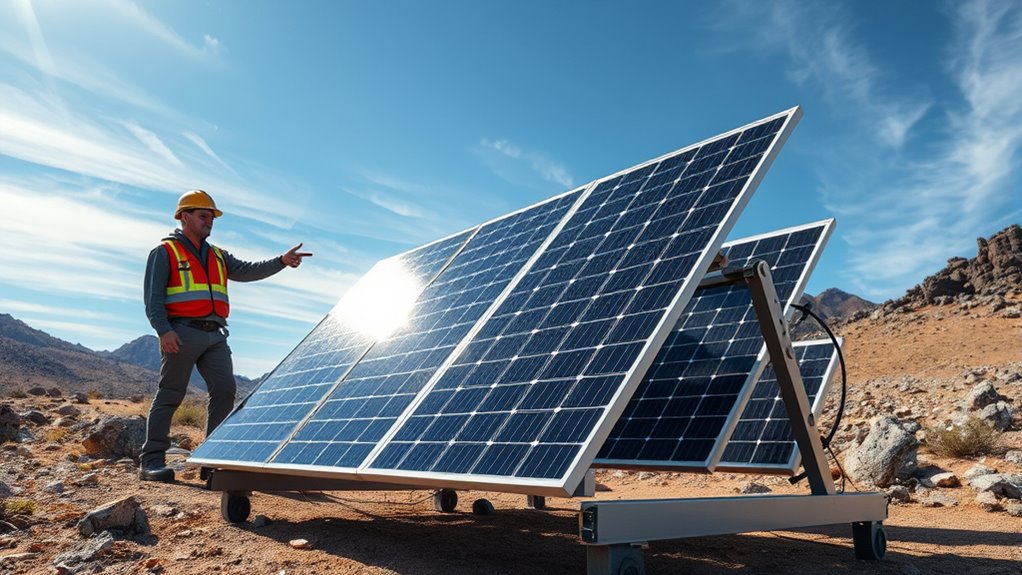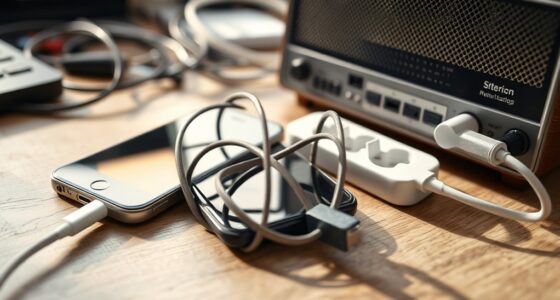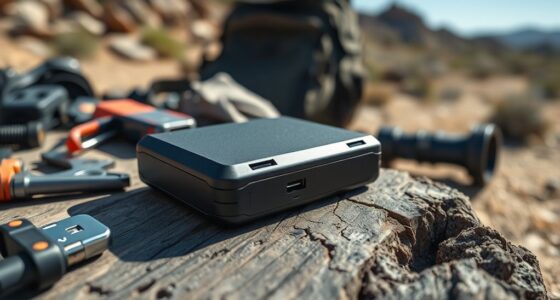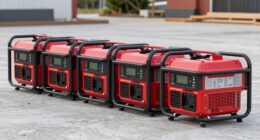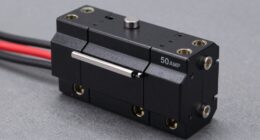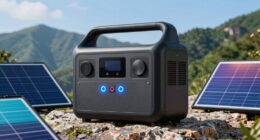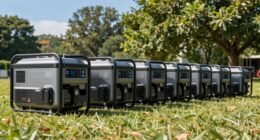Many believe solar power is unreliable during emergencies, but that’s a myth. Solar panels can work efficiently even on cloudy days or at night if you have batteries to store energy. To maximize your system, position panels correctly, keep them clean, and maintain batteries regularly. Remember, solar power provides a resilient energy source that keeps you connected when the grid fails. Keep going to discover more simple tips and facts to boost your emergency preparedness.
Key Takeaways
- Solar panels can operate efficiently during outages if paired with batteries, debunking the myth that they are unreliable in emergencies.
- Proper panel placement, cleaning, and maintenance maximize efficiency and ensure reliable energy during critical times.
- Cloudy days and night do not stop solar power if batteries are used to store energy for later use.
- Affordable, portable solar options are available, making emergency preparedness accessible and easy to implement.
- Understanding solar myths promotes resilient energy solutions that reduce dependence on vulnerable infrastructure during crises.
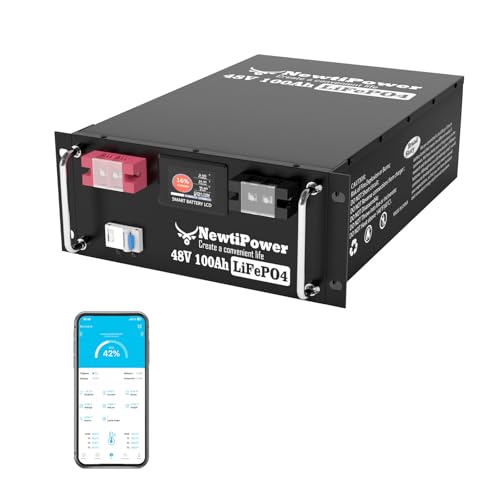
48V 100Ah Server Rack Lithium LiFePO4 Battery with Monitor and 200A BMS Grade A Cells,10000+ Cycles,Perfect for RV,Home Storage,Solar Power System
【Reliable Quality & Grade A Cells】: We have a professional lithium battery research and production factory, using A-grade...
As an affiliate, we earn on qualifying purchases.
Common Misconceptions About Solar Power During Emergencies
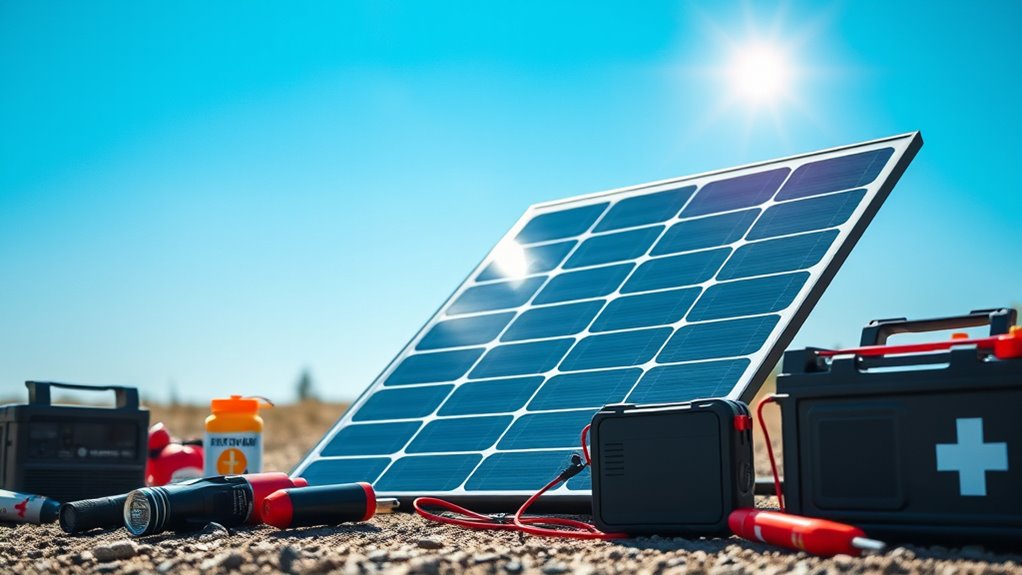
Many people believe that solar power is unreliable during emergencies, but this isn’t always true. This idea is a common solar myth that can prevent you from seeing its real benefits. In emergency facts, solar panels can operate efficiently even when power grids fail, provided you have enough sunlight and proper storage. Some think solar systems won’t work during cloudy days or at night, but with battery backups, you can store energy for later use. Others believe solar power is too expensive or complex to set up for emergencies, yet many affordable, easy-to-install options exist. Understanding these solar myths helps you realize that solar energy can be a reliable, resilient source of power when emergencies strike. Decoding fan culture insights can also help communities better understand and adopt sustainable energy solutions during crises.

DuroStar DS13000MX 13,000-Watt 500cc Dual Fuel Portable Generator - Gas and Propane, Remote Electric Start, Whole Home Power Backup, Transfer Switch Ready, RV & Emergency Ready
13,000 Watts of Reliable Power for Home Power Backup – Keep your home, job site, or RV powered...
As an affiliate, we earn on qualifying purchases.
Essential Facts Every Emergency Preparedness Kit Should Include
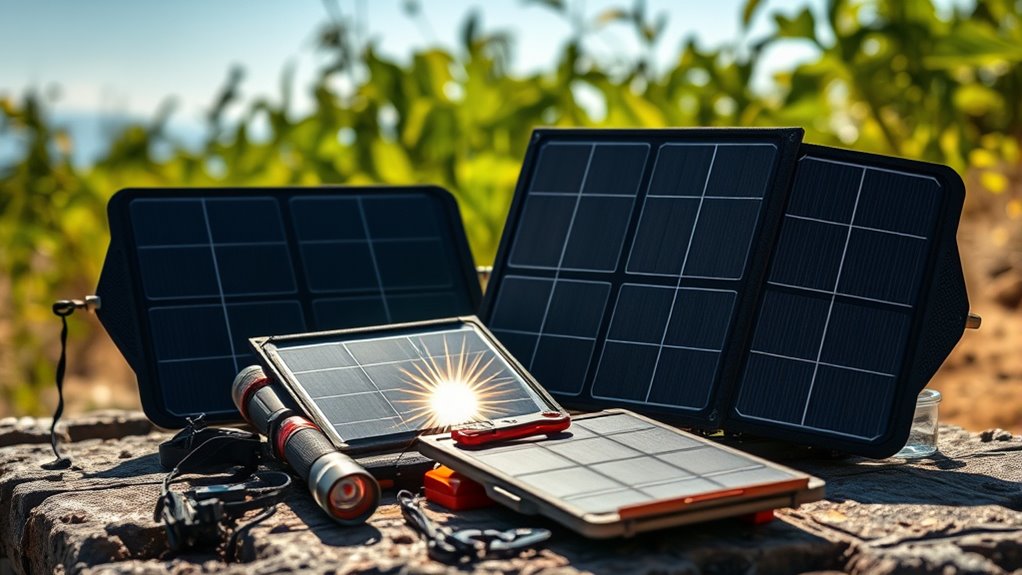
In any emergency, having a well-stocked preparedness kit is crucial to guarantee your safety and sustainment. Key items include reliable battery storage to keep your devices powered when the grid fails. Portable panels are indispensable for harnessing solar energy, especially if power outages last days. These compact, easy-to-use solar panels can charge batteries or power small devices directly. Ensure your kit contains sturdy, weather-resistant batteries and portable panels suitable for your needs. Don’t forget essential accessories like chargers, adapters, and cables to connect your solar setup smoothly. By including these components, you’re prepared to generate and store solar energy efficiently, giving you peace of mind during crises. Properly equipped, you’ll stay connected and safe when it matters most. Smart design can maximize your setup’s efficiency and ease of use in stressful situations.

Westinghouse 12500 Watt Dual Fuel Home Backup Portable Generator, Remote Electric Start, Transfer Switch Ready, Gas and Propane Powered
9500 Running Watts and 12500 Peak Watts (Gasoline); 8500 Running Watts, 11200 Peak Watts (Propane); Remote Start with...
As an affiliate, we earn on qualifying purchases.
Quick Tips to Maximize Solar Panel Efficiency When It Matters Most

To get the most out of your solar panels during critical moments, you need to optimize their positioning and maintenance. Proper panel placement ensures maximum sunlight exposure, so adjust angles seasonally if possible. Keep the panels clean and free of dirt or debris that can block sunlight. Regularly check your battery maintenance, ensuring batteries are charged and in good condition to store energy efficiently. Additionally, understanding the importance of air quality, which can impact the efficiency of your energy system, is essential for optimal performance.
Quick tips include:
- Position panels at the optimal angle for your location to maximize sunlight capture.
- Clean panels frequently to prevent dirt buildup that reduces efficiency.
- Monitor and maintain batteries to ensure they’re ready to store power when needed.
Focusing on these steps guarantees your solar setup performs reliably when it counts most.

Joinfworld Power Distribution Box,50A 125V/250V NEMA SS2-50 CS6375 Inlet, 30A Circuit Breaker, Individually Controllable Sockets, Heavy - Duty Waterproof Enclosure with Cooling Fan
UL-Certified - The power distribution box is UL-certified, featuring 1 50A socket, 5 NEMA 5-20 GFCI sockets, NEMA...
As an affiliate, we earn on qualifying purchases.
Frequently Asked Questions
How Long Do Solar Panels Typically Last in Emergency Conditions?
Your solar panels typically last 25 to 30 years in emergency conditions, but solar panel degradation can slightly reduce their efficiency over time. During an emergency, their power duration depends on the system size and energy storage. Proper maintenance helps extend their lifespan, ensuring reliable emergency power. Keep in mind, investing in quality panels and batteries can maximize emergency power duration and minimize degradation, giving you peace of mind during critical times.
Can Solar Panels Power an Entire Home During a Blackout?
You can power your entire home during a blackout with solar panels, but only if you have energy storage like batteries. Without storage, panels alone won’t provide continuous power. To achieve grid independence, install a battery system that stores excess energy for use during outages. This setup guarantees you stay powered, giving you peace of mind and independence from the grid during emergencies.
Are Portable Solar Panels Suitable for All Emergency Scenarios?
Portable solar panels are versatile tools for emergency preparedness, but they aren’t suitable for all scenarios. They provide portable power ideal for charging devices or small appliances, yet their limited capacity means they might not support larger power needs during extended outages. You should evaluate your specific emergency requirements and consider combining portable solar panels with other backup options to guarantee thorough preparedness for various situations.
What Maintenance Is Required to Keep Solar Panels Ready for Emergencies?
Think of your solar panels as loyal guardians, ready for action. To keep them battle-ready, you need regular cleaning routines—gently remove dust and debris that can block sunlight. Follow inspection schedules to catch any damage early, such as cracks or corrosion. Ensuring these simple steps keeps your panels efficient and reliable during emergencies, so you can trust they’ll shine bright when you need them most.
Do Weather Events Like Hail or Snow Damage Solar Panels?
Weather events like hail and snow can cause damage to your solar panels. Hail damage may crack or break the panels’ glass, reducing efficiency, while heavy snow can add weight and cause stress or shading issues. Regular inspections after storms help you spot and address any damage early. Installing hail-resistant panels and keeping snow cleared can safeguard your system and ensure it remains ready during emergencies.
Conclusion
Now that you’ve cut through the myths and learned the essentials, you’re better prepared to harness solar power when it counts. Think of your solar panel as a trusty sidekick, ready to shine even in tough times. With a little knowledge and quick tips, you’ll turn your emergency kit into a powerhouse of hope. Stay informed, stay prepared, and let the sun be your guiding light in any crisis.
